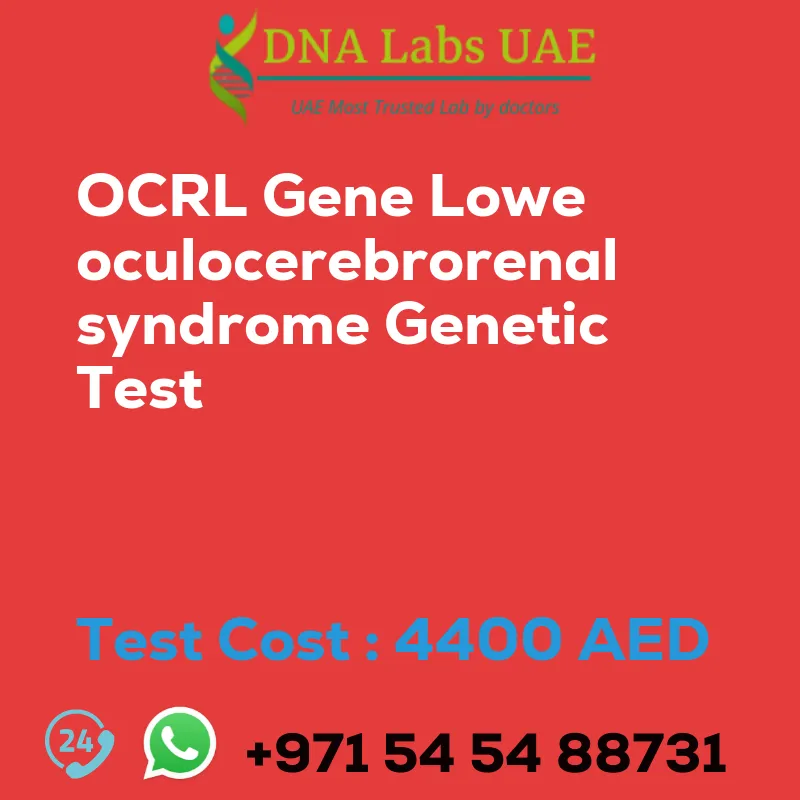OCRL Gene Lowe Oculocerebrorenal Syndrome Genetic Test
At DNA Labs UAE, we offer the OCRL Gene Lowe Oculocerebrorenal Syndrome Genetic Test. This test is designed to detect mutations in the OCRL gene, which is associated with Lowe Oculocerebrorenal Syndrome. This rare genetic disorder affects various body systems, including the eyes, brain, and kidneys.
Test Details
The OCRL Gene Lowe Oculocerebrorenal Syndrome Genetic Test utilizes NGS (Next-Generation Sequencing) technology. This advanced method allows for the simultaneous analysis of multiple genes, including the OCRL gene, to identify any mutations or genetic variants that may be present. The test can confirm a diagnosis of Lowe Oculocerebrorenal Syndrome and provide information about specific genetic changes involved.
Components and Price
The cost of the OCRL Gene Lowe Oculocerebrorenal Syndrome Genetic Test is AED 4400.0. The test requires a blood or extracted DNA sample, or just one drop of blood on an FTA Card. The report will be delivered within 3 to 4 weeks.
Test Type and Doctor
The OCRL Gene Lowe Oculocerebrorenal Syndrome Genetic Test falls under the category of Neurological Disorders. It is conducted by our experienced Neurologist in the Genetics department.
Pre Test Information
Prior to undergoing the OCRL Gene Lowe Oculocerebrorenal Syndrome Genetic Test, it is essential to provide the clinical history of the patient. Additionally, a Genetic Counselling session will be conducted to draw a pedigree chart of family members affected by the syndrome.
Why Choose the OCRL Gene Lowe Oculocerebrorenal Syndrome Genetic Test?
The OCRL Gene Lowe Oculocerebrorenal Syndrome Genetic Test is recommended for individuals who exhibit symptoms or have a family history suggestive of Lowe Syndrome. It can also be utilized for carrier testing in individuals without symptoms but with a family history of the condition.
How Does the Test Work?
The OCRL Gene Lowe Oculocerebrorenal Syndrome Genetic Test involves collecting a blood or saliva sample from the individual. This sample is then sent to our laboratory for analysis. Our specialized techniques enable us to sequence the DNA and identify any mutations or genetic variants in the OCRL gene.
Implications of Test Results
The results of the OCRL Gene Lowe Oculocerebrorenal Syndrome Genetic Test can guide medical management and treatment decisions for individuals with Lowe Oculocerebrorenal Syndrome. Additionally, it provides information about the likelihood of passing the condition on to future generations.
It is important to note that genetic testing should be performed alongside a comprehensive clinical evaluation and consultation with a genetic counselor or healthcare provider. They can help interpret the test results, provide information about the findings, and offer guidance on the best course of action for the individual and their family.
| Test Name | OCRL Gene Lowe oculocerebrorenal syndrome Genetic Test |
|---|---|
| Components | |
| Price | 4400.0 AED |
| Sample Condition | Blood or Extracted DNA or One drop Blood on FTA Card o |
| Report Delivery | 3 to 4 Weeks |
| Method | NGS Technology |
| Test type | Neurological Disorders |
| Doctor | Neurologist |
| Test Department: | Genetics |
| Pre Test Information | Clinical History of Patient who is going for OCRL Gene Lowe oculocerebrorenal syndrome NGS Genetic DNA Test A Genetic Counselling session to draw a pedigree chart of family members affected with OCRL Gene Lowe oculocerebrorenal syndrome |
| Test Details |
OCRL gene Lowe oculocerebrorenal syndrome NGS genetic test is a type of genetic test that is used to detect mutations in the OCRL gene. This gene is associated with Lowe oculocerebrorenal syndrome, which is a rare genetic disorder that affects multiple body systems including the eyes, brain, and kidneys. The NGS (Next-Generation Sequencing) technology used in this test allows for the simultaneous analysis of multiple genes, including the OCRL gene, to identify any mutations or genetic variants that may be present. This test can help confirm a diagnosis of Lowe oculocerebrorenal syndrome and provide information about the specific genetic changes involved. The OCRL gene Lowe oculocerebrorenal syndrome NGS genetic test is typically recommended for individuals who have symptoms or a family history suggestive of Lowe syndrome. It can also be used for carrier testing in individuals who have a family history of the condition but do not show any symptoms themselves. The test involves collecting a blood or saliva sample from the individual, which is then sent to a laboratory for analysis. The laboratory uses specialized techniques to sequence the DNA and identify any mutations or genetic variants in the OCRL gene. The results of the test can help guide medical management and treatment decisions for individuals with Lowe oculocerebrorenal syndrome. It can also provide information about the likelihood of passing the condition on to future generations. It is important to note that genetic testing is typically performed in conjunction with a comprehensive clinical evaluation and consultation with a genetic counselor or healthcare provider. They can help interpret the test results, provide information about the implications of the findings, and offer guidance on the best course of action for the individual and their family. |







